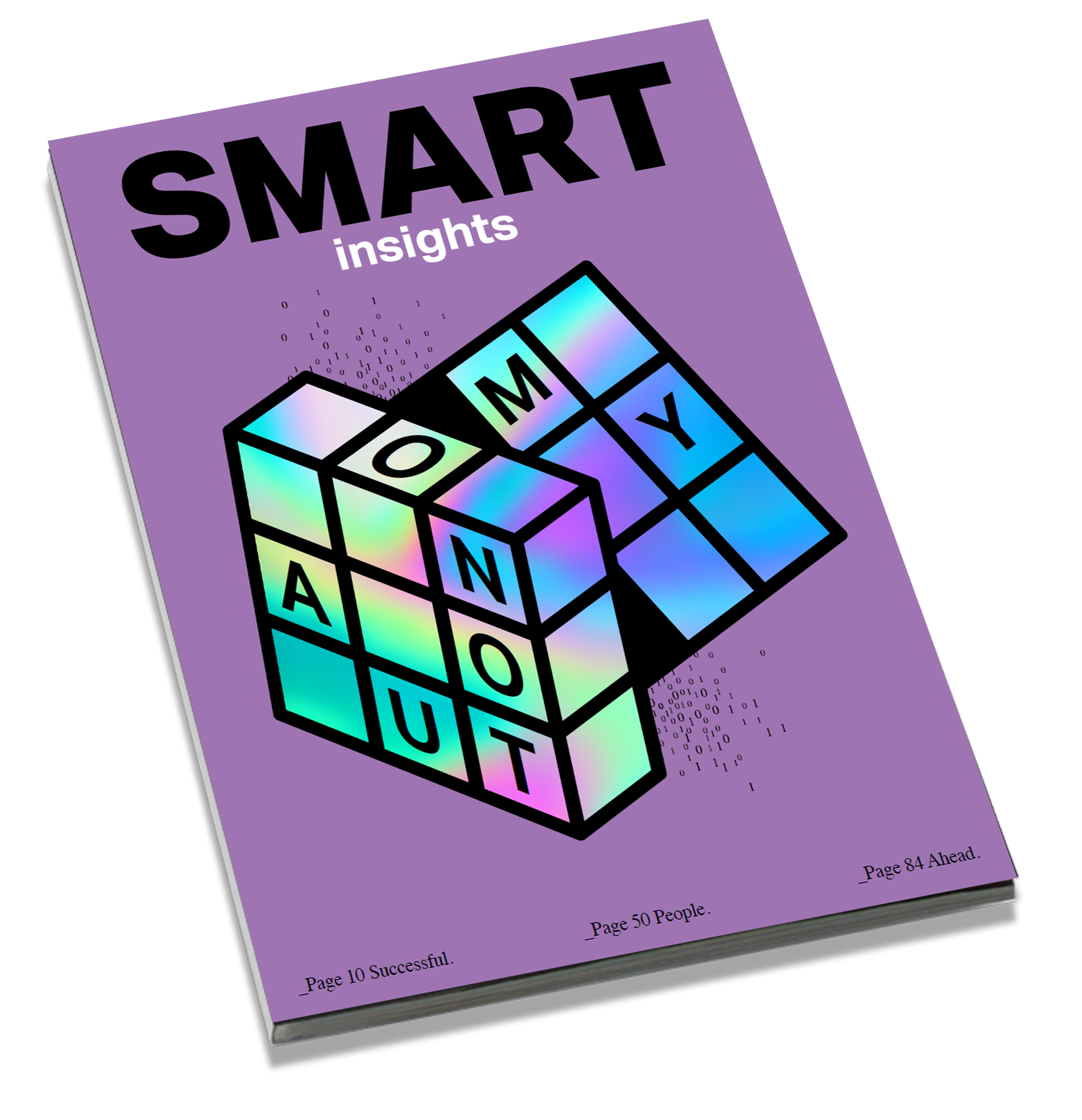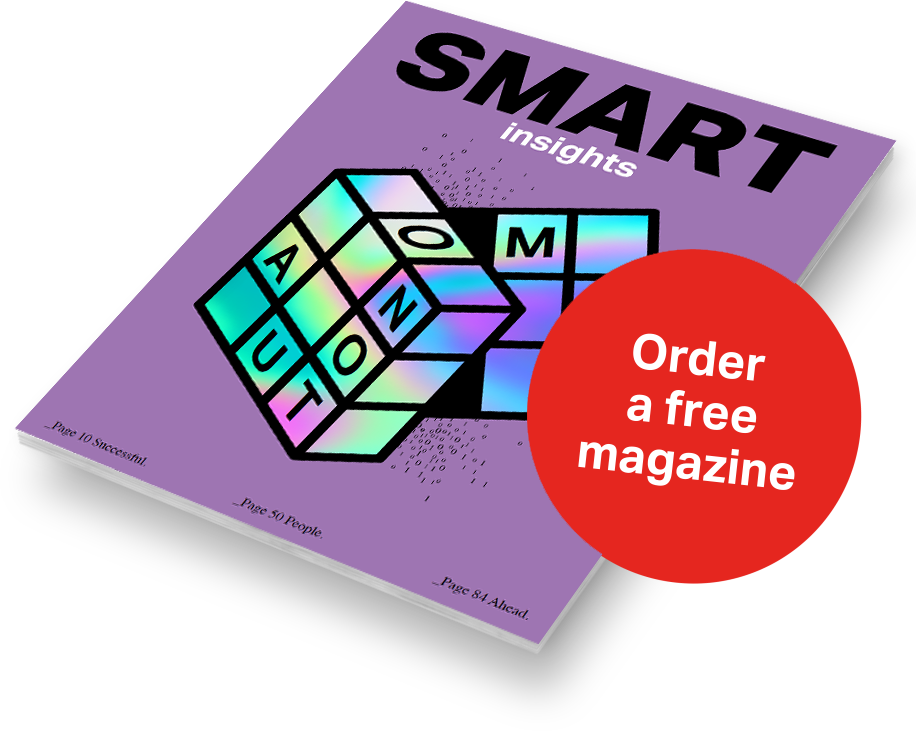This article was published in the Ergon Magazine SMART insights 2023. Order your free copy now.
As Migros Group COO, Rainer Baumann is responsible for IT, analytics, engineering and the supply chain. While still at high school he worked as an IT consultant for schools and SMEs, and as a student he wrote software for CERN and the first ETH thesis on quantum computing. With ambitions to be an astronaut, he ultimately found his calling at the intersection of IT and business. The secret of his success? Finding his own management style with a focus on expertise and good intentions. Not to mention a soft spot for humanity, empathy and family.
What vision do you pursue as Group COO?
I want to position Migros as an exemplary company at the heart of the Swiss economy, that represents a high-quality value chain here in Switzerland. I particularly want to generate added value using technology. It’s an area in which there is immense pressure from the international competition. I think that our ecosystem can keep pace with them in the long term, but we have to stay on the ball.
Where do you get your passion for technology and engineering?
I’ve always been curious, and experimented with lots of technical things as a child. When I was nine, I found a couple of speakers at my grandfather’s, and took them apart, rewired them and put them together again. It gave me a very quick and tangible lesson in the difference between direct and alternating current! I have stayed very practice focused, because I think we learn more from practice than from theory.
Was your grandfather your role model?
Definitely. He inspired me as a person and as a businessman. He knew the names of each of the hundreds of people who worked for him, and personally gave them flowers for their birthday. I was often allowed to go with him and hand them over. He started with nothing and did a lot of great things. He was impressive. A man of unparalleled humanity. He was a big influence on my sense of people-centred leadership, just as my wife is.
What else has inspired you?
A book called ‘Why should anyone be led by you?’, which describes why we need genuine people to lead us. I realised why many of the business greats are valued by their employees as authentic leaders, although they are generally controversial public figures. Humanity is underestimated, especially in engineering. When you’re dealing with modern technology you want your manager to understand you, you want to learn from them, and you want to talk shop with them. I’m a fan of Apple’s Leadership Manual. Delegate less and actively work together more.
And what role does your father play?
He was an early supporter of my technical talent, and gave me an Atari computer with a GCR floppy drive and a 40 MB removable disc. As a secondary school teacher, he wrote exams on the computer in the late 1980s. His school didn’t have an IT officer, and since I was pretty savvy I was hired to do the job as a 14-year-old high school student. Another couple of schools took me on later. Whether installing networks or printers, I was responsible.
“Without empathy, without responding to what people need, you’ll never bring them on side.”
What happened when you finished high school?
Local authorities integrated schools’ IT into their own IT, where the market was dominated by PC heavy major players such as Compact. So I lost these schools as customers, and shifted focus instead to SMEs such as law firms or architecture studios, who needed quality IT.
Then you began to study IT?
Yes, but I was a bit overconfident and signed up for physics as a subsidiary subject. I did my minor in quantum physics and my internship at CERN. When I was there I wrote software that is still being run 100 million times a second. In 2001 I wrote the very first thesis on quantum computing at ETH Zurich. The subject was irrelevant until five years ago, because it wasn’t seen as scalable. Now it is scalable, and is likely to become fundamental soon.
What about the rest of your career up to now?
After the ETH I did my doctorate and worked for an SME. During the financial crisis I became aware that it was time for a new challenge, so I applied to the European Space Agency to become an astronaut. I wasn’t accepted, but I got relatively far along in the process. So I thought that if I couldn’t be an astronaut, I would go into consulting. That led me to apply to McKinsey, where I later became a partner. After working in-house at Swiss Re for a time, I landed at Migros. The biggest influence and drive behind my career has been my wife, who is still my greatest inspiration.
What are your top tips for managers?
Deliberately develop your own management style. It will determine how effectively you work with other people, and how your team sees you as a leader. Never forget that expertise and good intentions are the core success factors. A lack of either results in egotism and politicking, and puts a spanner in the works of innovation.
So empathy is important to you?
It is. I think that without empathy, without understanding and responding to what people need, you’ll never bring them on side. Although that only works 99 per cent of the time in practice! Now and again you have to say, “I’m sorry, I know, but we’re doing it like this”. That happens once every couple of weeks, and I feel guilty about it. I might seem tough on the outside, but I’m a softie, and I think that genuine vulnerability accentuates my people-friendly management style.
What do you expect from external partners?
Expertise and a positive approach to cooperation. It’s important to know that service providers who do ‘only’ what the customer wants are great for everyday work but not for innovative projects that are knowledge intensive. Our partners should think about what we need, beyond their particular areas, and proactively and constructively help to shape our future. Ultimately, we choose external professionals not just to get work done, but to become more successful. That’s one of the reasons we work with Ergon and Airlock, whose teams exemplify this mindset.
So you want partners to work with you as equals?
I got used to using the informal form of address in German – ‘Du’ not ‘Sie’ – 20 years ago, because I always talk directly to the other person, and also want to hear back directly. I treat internal and external partners exactly the same.
How important is your family to your career?
Family is the most important thing in life. I recharge by walking in the woods with my wife and daughter, not at events that I have to attend for work. While careers develop, family and all that goes with it is a constant.
Interested in more?
Digitisation projects
Change makers
Tech trends
Order now

